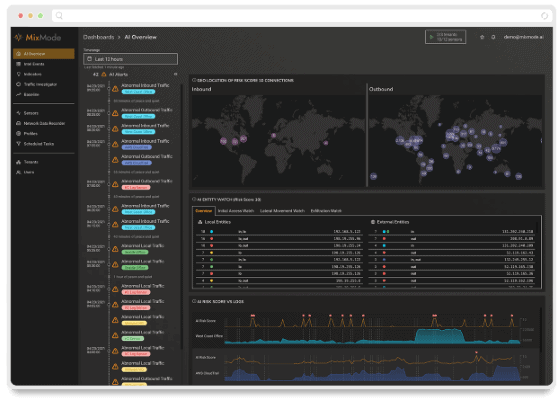Mixmode Blog
Lorem ipsum dolor sit amet, consectetur adipiscing elit.
The State of Cloud Security: New MixMode Report Finds Enterprises Are Struggling to Keep Pace with Security As Cloud Adoption Accelerates
he new State of Cloud Security Report from MixMode summarizes input from 588 security professionals and reveals significant gaps in organizations’ abilities to secure cloud platforms and workloads. Despite multi-cloud adoption reaching mainstream levels, critical capabilities for cloud security, such as real-time threat detection and response, comprehensive visibility, workload protection, and data security, still need to be improved.
Read MoreMixMode Releases State of Cloud Security 2023 Survey and Cloud Detection and Response for AWS
MixMode, the leader in delivering generative AI cybersecurity solutions for real-time threat detection and response at scale, today released its annual State of Cloud Security report along with the availability of MixMode Cloud Detection and Response (CDR) for AWS in the AWS Marketplace. The report provides sobering statistics on the gaps enterprises face in securing multi-cloud and hybrid environments.
Read MoreCISOs: Are You Applying NIST / CISA Standards to ALL Data Including the Cloud?
Security leaders want to solve problems identifying and understanding anomalies or account access behaviors by correlating anomalous behaviors of specific accounts with other parameters like geography or ingress and egress points, but few rules-based Cybersecurity tools have the ability to do that without a great deal of manual data massaging and manipulating.
Read MoreSEC Adopts New Cybersecurity Risk Management and Reporting Rules: What Businesses Need to Know
The Securities and Exchange Commission (SEC) recently adopted significant changes around cybersecurity risk management, strategy, governance, and incident disclosure requirements for public companies.
Read MoreKey Takeaways from Black Hat 2023
Overall, Black Hat 2023 demonstrated that the cybersecurity landscape continues to evolve rapidly. The event highlighted both the threats posed by emerging technologies like AI, as well as the potential for new defensive techniques.
Read MoreCybersecurity Industry Leader Bob Pratt Joins MixMode as Senior Vice President of Product
MixMode Inc., the leader in generative AI cybersecurity solutions for real-time detection and response, today welcomed Bob Pratt as its new Senior Vice President of Product. In this role, Pratt will be responsible for all aspects of the MixMode product portfolio, including UX design, roadmap, product research and development.
Read MoreWebinar: Achieving Security at Big Data Scale – Why Organizations are Struggling with Legacy Tools and The Promise of Generative AI
Cybersecurity veterans discuss the challenges large enterprises in the Fortune 1000 face in scaling security monitoring and threat detection across big data environments.
Read MoreMixMode Strengthens Generative AI Threat Detection Platform with New Enhancements
MixMode announce today the availability of its quarterly Generative AI Platform update. Continuing to innovate with new features that drive threat detection and response capabilities in large data environments, the latest updates include expanded cloud data ingestion capabilities, including support for the ingestion of Identity Data, integrations with the MITRE ATT&CK Framework, and expanded deployments across cloud environments.
Read MoreZero Day Summer is No Vacation
“Zero-day Summer” refers to the period during summertime when cybercriminals take advantage of the vulnerabilities in software, applications, and computer systems that remain undetected and unpatched by security teams.
Read More









